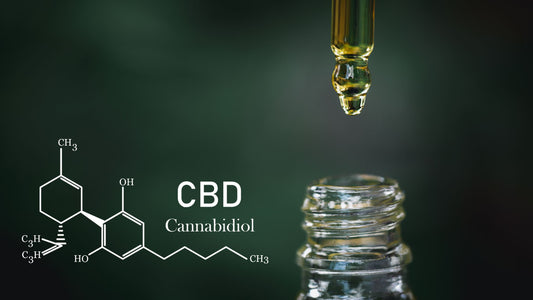
What is CBD, and What Can it Help?
We here at Bodega are CBD-obsessed, but we get it, there is a lot to learn. So we're breaking down the two main questions we get the most at our store locations: What is CBD? and What Can it Help?
WHAT IS CBD?
Cannabidiol, is a naturally occurring compound found in the resinous flower of the hemp plant and commonly referred to as CBD (Non-drug plants produce relatively high levels of CBD and low levels of THC). Cannabidiol has been celebrated throughout history for its wide array of health benefits and therapeutic properties. CBD has been scientifically proven to modulate and repair many physiological systems in the human brain and body, through the endocannabinoid system. Found in all mammals, the endocannabinoid system is made up of several receptors that react only to cannabinoids. CBD is a safe, non-addictive substance that can be consumed in a variety of different ways without the effects of the ‘high’ commonly associated with THC.
PAIN
CBD is an anti-inflammatory for muscles and joints. The ECS (Endocannabinoid System) is active throughout the neuraxis (axis of the Central Nervous System), including integrative functions in the periaqueductal gray matter (primary control center for descending pain modulation), and in the ventroposteriolateral nucleus of the thalamus (relay motor and sensory signals to the cerebral cortex), in which cannabinoids proved to be 10-fold more potent than morphine in wide dynamic range neurons mediating pain.
DEPRESSION
CBD has the ability to inhibit FAAH gene activity that increases endocannabinoid and anandamide signaling. Cannabidiol reduces psychotic symptoms through this gene and its interaction with serotonin 5-HT1a receptors, GPR55 receptors, and vanilloid-1 receptors. The use of cannabidiol on a consistent basis aids in the perception of these causes, and the reactions moving forward to dealing with anxiety-causing triggers that can lead to disorders such as depression.
ANXIETY
Cannabidiol connects to neurotransmitters in the brain to regulate chemical constituents such as dopamine, serotonin, and glutamate. The anxiolytic actions of CBD promote homeostasis regarding these areas that affect the personality and cognitive behaviours. CBD can severely reduce anxiety, cognitive impairment and be helpful as a sedative.
ADDICTION
Through serotoninergic and glutamatergic systems, CBD balances drug reward and stress vulnerability, both of which trigger cravings and relapse in addicted individuals. It also mediates reward, goal-directed behaviour and habit formation relative to addiction.
NEUROLOGICAL
Neurodegenerative brain disease is a slow progression of the neuronal function in specific areas like cognitive, motor and/or behavioural dysfunctions. CBD has been reviewed for its prevention and management of main neurodegenerative disorders by protecting neuronal and non-neural cells against factors that affect these functions. This includes B-amyloid (plaque found in the brain of AD patients) or 6-hydroxydopamine (a neurotoxic compound that destroys neurotransmitters like dopamine and glutamate).
ACNE
CBD on the human skin gland is effective by inhibiting oil production and a rapid increase in cell formation. This is through the vanilloid-4 channel, which influences glucose and lipid metabolism. Another G protein-coupled receptor A2A adenosine uses CBD to exert complex anti-inflammatory actions to decrease in the progression of acne vulgaris.
ANTI-AGING
Cannabidiols anti-inflammatory properties are effective as anti-aging skincare treatments. Antioxidant properties in CBD allow for free radicals to be minimized and oxidation of healthy cells to remain undamaged by external and internal environments. CBD is more potent than Vitamin C and E in this medicinal action. Anti-inflammatory effects on the dermis include response to free radicals as well as the surrounding tissues from the degradation of collagen and elastin.
DERMATITIS
Cannabinoid Type 1 and 2 Receptors (CB1/2) act to suppress immune and inflammatory processes with the use of exogenous cannabinoids like CBD. Any inflammatory response in the skin due to allergens, infections, and eczema responds to balance infiltrating immune cells, keratinocytes, and sebocytes.
NEUROLOGY
Cannabidiol promotes neurogenesis and neuroplasticity by repairing damage from concussions and building new brain cells. Physiologically, CBD acts as a vasodilator and regulates calcium ion production and nitric oxide production to decrease the frequency of muscle spasms. CBD also works within our bone marrow via CB1 and has potent anti-inflammatory action by modulation cytokine production.
PMS
The symptoms of PMS influence a wide range of body functions, from hormonal to muscular. There are 4 different types of PMS that include: PMSA (anxiety-high estrogen), PMSB (bloating), PMSC (cravings) and PMSD. All types throughout one menstrual cycle are common. CBD acts as an anti-inflammatory, antioxidant, anxiolytic and muscle relaxant to relieve these symptoms that most women experience on a consistent basis.
MENOPAUSE
Menopause marks the end of a woman’s reproductive abilities by naturally stopping menstruation cycles due to a decrease in the production of the hormone estrogen. Hot flashes, mood swings, loss of bone mass, low libido, weight gain, insomnia, and pain are all symptoms of menopause. It is understood that a deficiency in endocannabinoids is the result of these conditions and can be brought back to balance by using CBD.
PET HEALTH
Found in all mammals, endocannabinoids are naturally occurring receptors that process cannabinoids when they enter the body. Household pets including dogs and cats have experienced increased joint movement and reduced pain after consuming CBD. "Cannabis oil can be used to treat seizures, nausea, stress, anxiety, arthritis, back pain, symptoms of cancer, and gastrointestinal issues, among other health conditions in dogs.” - petmd.com
“Our goal is to create beauty and wellness through education and promote harm reduction by re-introducing ancient plant-based medicinal solutions.” - Bodega Wellness





